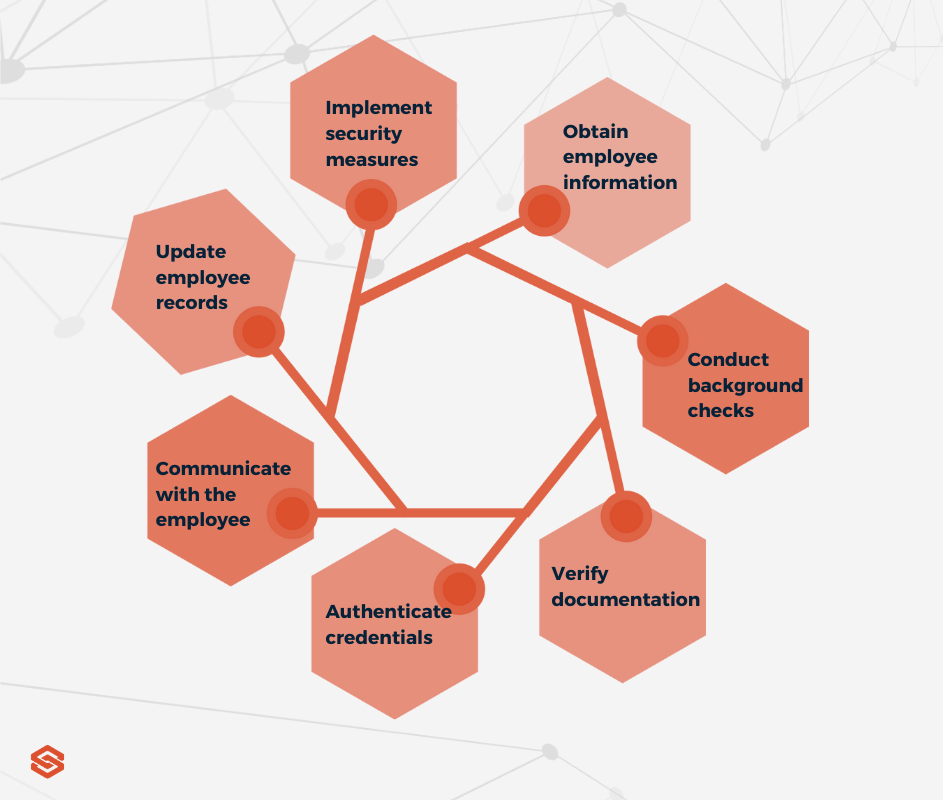As a manager who likely spends a significant amount of time at work, one of the most crucial aspects of your job is undoubtedly the people you work with. The productivity and success of your employees, as well as their trust and contribution to the organization, are vital factors for any employer. This is why it's essential to know your employees.
Knowing your employees goes beyond basic familiarity. It involves understanding their work rights, establishing effective communication, and providing a comfortable work environment that motivates them to perform at their best. As an employer, you must also prioritize corporate security by verifying the identity and background of potential employees through KYE measures.
By understanding your employees, you can identify their strengths and weaknesses and tailor their roles and responsibilities accordingly, which can lead to improved productivity and job satisfaction. Additionally, a solid understanding of your employees can help you make informed decisions regarding their compensation and career progression.
It's also essential to note that there is no direct relationship between KYE and money laundering. KYE is a process that aims to identify and verify employees' identities and backgrounds to ensure that they are suitable for their roles within the organization. Money laundering, on the other hand, involves the illegal transfer of funds or assets to conceal their origin.
Why is It Important to Know Your Employee?
Knowing your employees is essential for various reasons. One of the primary benefits is to ensure employee satisfaction and loyalty. By getting to know your employees, understanding their responsibilities and requirements, and providing a comfortable working environment, you can build trust and reliability in the workplace.
Healthy work culture is another benefit of knowing your employees. When employees feel motivated and happy in their jobs, they are more likely to work better and collaborate with each other. They are also more likely to help each other out, leading to a more organized and productive workplace.
Additionally, KYE is a necessary program to determine an employee's background, especially if they have a history related to money laundering activities. Weak KYE procedures and lack of precautions may result in employee fraud and money laundering activities that can cause significant corporate losses. Therefore, it's crucial to conduct background screening checks and obtain background information before interviewing potential employees.
KYE Steps

- Obtain employee information: Collect all necessary information from the employee, including their full name, address, date of birth, and social security number. Additionally, collect their work history, education, and references. Ensure that all information provided is accurate and up-to-date.
- Conduct background checks: Perform comprehensive background checks to verify the employee's identity and past criminal history. This includes conducting criminal background checks, credit checks, and employment history checks. You can also use a third-party provider to conduct these checks, which may be more reliable and thorough.
- Verify documentation: Ensure that the employee has provided valid documentation for employment purposes, such as a passport, driver's license, or social security card. Verify that the documents are genuine and not forged.
- Authenticate credentials: Confirm that the employee has the necessary credentials and qualifications for the job. This may include verifying their education and professional certifications. You can request official transcripts or certification documents from the educational institution or certification provider.
- Communicate with the employee: Establish a relationship with the employee and provide a comfortable work environment. Discuss their job responsibilities, performance goals, and work-life balance. Regularly communicate with the employee to maintain a positive relationship.
- Update employee records: Keep accurate and up-to-date records of all employee information and documentation. This includes their personal information, employment history, performance evaluations, and any certifications or qualifications they acquire.
- Implement security measures: Establish security measures to protect the organization against employee fraud and money laundering activities. This includes monitoring employee activities, implementing secure access controls, and conducting regular audits. Additionally, ensure that all employees are aware of the company's security policies and procedures.
Conducting a comprehensive KYE process involves obtaining accurate employee information, performing background checks and document verification, authenticating credentials, communicating with employees, updating employee records, and implementing security measures. By following these steps, a company can ensure the reliability and security of its workforce.
Non-Compliance Risks of KYE
Non-compliance with Know Your Employee (KYE) regulations can lead to several risks for companies. Here are some of the key risks associated with non-compliance:
- Increased regulatory scrutiny: Governments and regulatory bodies worldwide are cracking down on financial crimes, including money laundering and terrorism financing. Non-compliance with KYE regulations can lead to increased regulatory scrutiny, fines, and penalties.
- Reputation damage: Failure to comply with KYE regulations can damage a company's reputation and brand image. It can lead to negative publicity, loss of trust among customers, and reduced business opportunities.
- Financial losses: Non-compliance with KYE regulations can result in financial losses due to employee fraud or money laundering activities. This can lead to loss of revenue, legal costs, and damage to the company's financial stability.
- Legal repercussions: Non-compliance with KYE regulations can result in legal action against the company and its employees. This includes civil or criminal charges, fines, or even imprisonment.
- Loss of business opportunities: Non-compliance with KYE regulations can lead to the loss of potential business opportunities. Many businesses and investors require KYE compliance as a prerequisite for doing business, and non-compliance can result in lost business deals.
